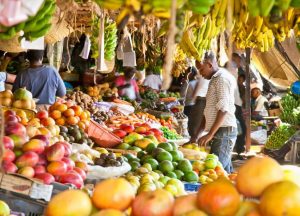Key organizations sign deal on Africa’s food security
 Four multilateral organizations joined officials from the African Union on Monday in Rwanda’s capital Kigali for the signing of a deal to formalize their commitment to jointly working toward addressing food and nutrition security on the continent.
Four multilateral organizations joined officials from the African Union on Monday in Rwanda’s capital Kigali for the signing of a deal to formalize their commitment to jointly working toward addressing food and nutrition security on the continent.
They comprised the World Bank, the UN Food and Agriculture Organization (FAO), the African Development Bank Group and the International Fund for Agricultural Development (IFAD).
The signing ceremony took place at the African Food Security Leadership Dialogue, which concludes Tuesday.
The signing formalized cooperation in the implementation of decisions on agriculture and food security under the framework of the Malabo Declaration on Accelerated Agriculture Growth and Transformation adopted in 2014 by the African Union Assembly in Malabo, Equatorial Guinea under which countries committed to end hunger in Africa by 2025.
The deal committed the organizations to supporting urgent action to adapt Africa’s agriculture to climate change, eradicate hunger and malnutrition and promote resilient, efficient and inclusive food systems as well as create jobs in agricultural value chains for a rapidly growing young population.
“To these ends, we emphasize the need to implement the commitments on agriculture and food security espoused in the Malabo Declaration, Agenda 2063 and the Paris Agreement on Climate Change,” the communique reads in part.
World Bank Vice President Hafez Ghanem signed on behalf of the global lender while Maria Helena Semedo, deputy director-general of the FAO, signed on behalf of the UN food agency.
“Of the 50 most food-insecure countries in the world, 31 are African countries. Therefore, we need to take specific actions for our continent to ensure food security,” IFAD President Gilbert Houngbo said after the signing.
Under the agreement, the organizations committed to work within a food systems framework to adapt Africa’s agriculture to climate change and sustainably increase productivity, enhance resilience and reduce food loss and waste while enhancing management of land, soil, water and biodiversity.
An agriculture expert at the meeting told Anadolu Agency that the agreement is significant, as the organizations will coordinate better at the country and regional levels.
Joint actions can lead to better impacts than what the individual organizations could offer working separately, he said.
Speaking at the event, Rwandan President Paul Kagame mentioned the need for a continent that is truly prospering in ‘every sense of the term’, noting that agriculture is undoubtedly the foundation of Africa’s prosperity.
Noting that the continent is off track with the Malabo Declaration’s target of eradicating hunger by 2025, Kagame warned that undernourishment could negatively impact today’s children throughout their lives and put the entire human development agenda in Africa at risk if the trend is left unchecked.
More than 250 delegates, including senior officials and leaders of key organizations supporting major food security programs in Africa, are attending the African Food Security Leadership Dialogue.
The FAO has said in a recent report that Africa is the world’s most food-insecure region with about 256 million people facing undernutrition in 2018.
It noted that the situation is getting worse in many parts of the continent because of the negative effects of climate change on agricultural productivity, natural resources degradation, rapid population growth, increasing fragility and insecurity and economic stagnation.
Author: James Tasamba
Photo Courtesy: link























